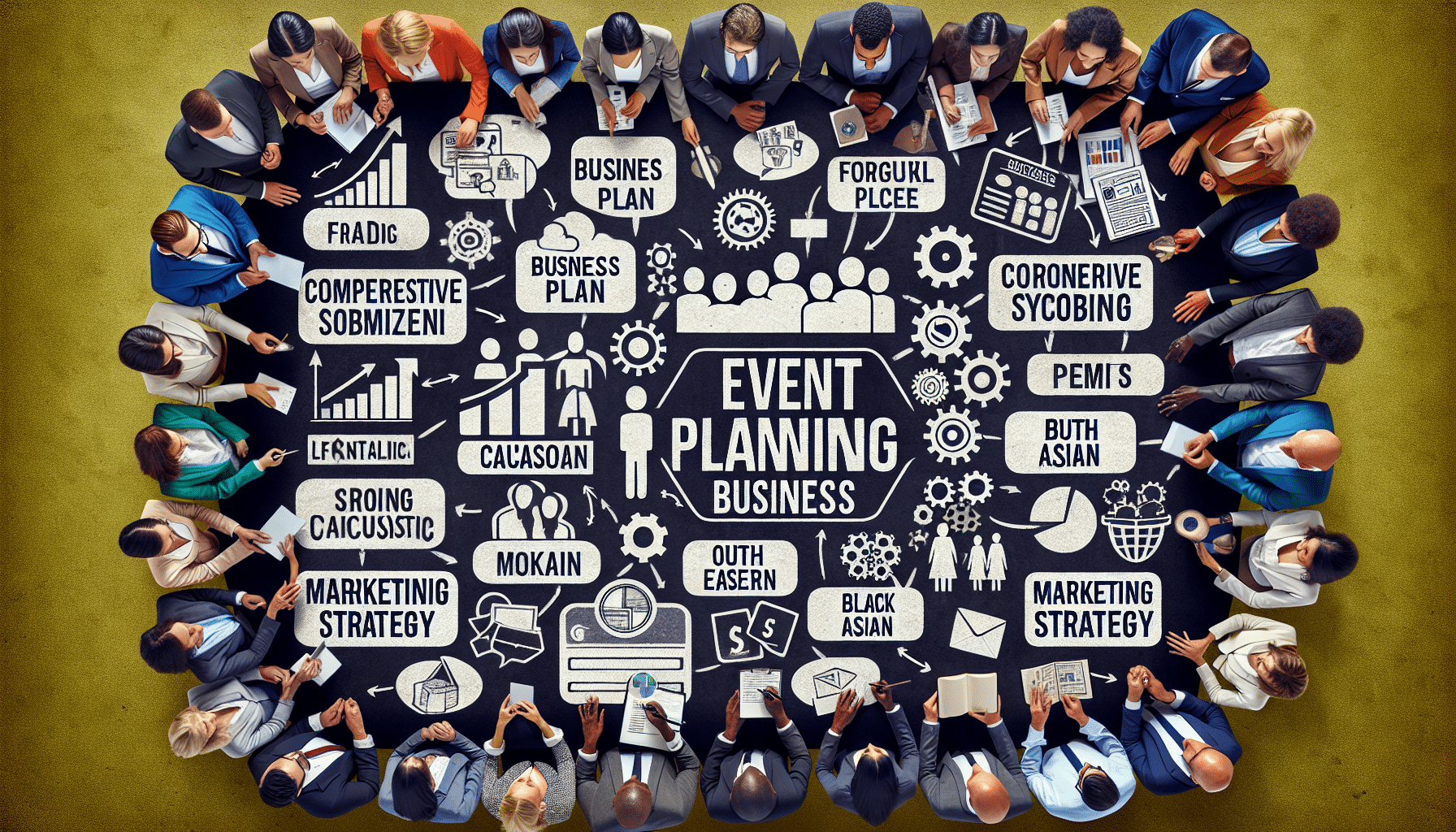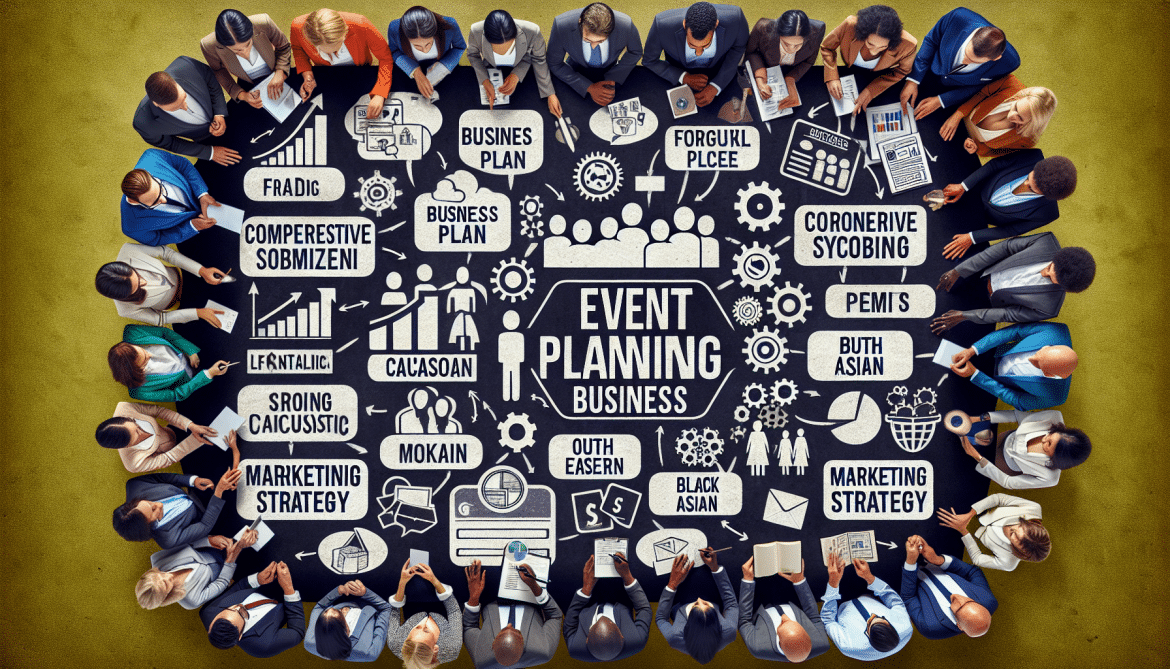So you've always had a knack for organizing and bringing people together, and now you're ready to turn that passion into a business venture. Starting an event planning business can be an exciting and fulfilling journey, but where do you even begin? In this article, we'll explore the essential steps and strategies for launching your own successful event planning business. From honing your skills and networking, to finding your niche and creating a solid business plan, we'll provide you with the guidance and resources you need to get started on the right path. Whether you're planning weddings, corporate events, or social gatherings, this article will help you lay the foundation for a thriving event planning business. So grab your notebook and let's dive into the world of event planning!
Choosing a Business Name

This image is property of images.pexels.com.
Considerations for choosing a business name
Choosing the right name for your event planning business is an important decision that can greatly impact your brand's image and recognition. As you consider different options, there are a few key considerations to keep in mind. First and foremost, your business name should reflect the nature of your services and resonate with your target market. It should be easy to remember, spell, and pronounce. Additionally, it's important to check for trademark availability to ensure you won't face any legal issues down the line. Finally, securing a matching domain name for your business website is essential in today's digital age.
Trademark availability and domain name
Before finalizing your business name, it's crucial to conduct a thorough search to ensure there are no existing trademarks that could potentially infringe upon your chosen name. This can be done through a trademark search on the website of the United States Patent and Trademark Office (USPTO) or consult a trademark attorney for professional guidance. Once you have cleared the trademark hurdle, the next step is to secure a domain name that aligns with your business name. A memorable domain name not only enhances your online presence but also helps potential clients easily find you on the internet.
Legal requirements for naming your business
When it comes to naming your business, it's essential to comply with legal requirements. Start by checking the regulations and guidelines set by your local government or state authorities regarding business naming conventions. Some jurisdictions may require you to include specific words or phrases in your business name to differentiate it from other registered businesses. It's also crucial to avoid using misleading or deceptive names that may confuse your potential clients. Familiarize yourself with the legal requirements in your area and consult with a business attorney if you have any uncertainties to ensure compliance.
Defining Your Target Market
Identifying your target market
Identifying and understanding your target market is a fundamental step in developing a successful event planning business. Start by conducting market research to gain insights into the preferences and needs of your potential clients. Determine which demographic or geographic segments align with your services and specialize in catering to their specific requirements. By narrowing down your target market, you can tailor your offerings and marketing strategies to appeal directly to their preferences, ultimately increasing your chances of success.
Segmenting the event planning market
The event planning market is diverse and encompasses a wide range of events and clients. By segmenting the market, you can better understand the unique needs and expectations of different client types, allowing you to tailor your services accordingly. Consider segmenting the market based on event types, such as corporate events, weddings, social events, or nonprofit events. Within each segment, further divide the market based on demographics, budget preferences, or location. This segmentation will help you refine your marketing efforts and provide targeted solutions to different client segments.
Researching target market needs and preferences
To effectively serve your target market, it's crucial to conduct thorough research on their needs and preferences. This can be done through surveys, interviews, or focus groups to gather valuable insights. Understand their pain points, their expectations from an event planning service, and the factors they consider when selecting an event planner. By understanding your target market's preferences, you can develop tailored service offerings, pricing strategies, and marketing campaigns that align with their specific needs. Regularly update your research to stay up-to-date with evolving trends and preferences within your target market.
Creating a Business Plan
Importance of a business plan
A business plan serves as a roadmap for the success of your event planning business. It outlines your goals, strategies, and financial projections, providing a comprehensive overview of your business. Developing a business plan not only helps you stay focused and organized but also serves as a valuable tool when seeking funding or external support for your venture. It forces you to think critically about your business model, target market, competition, and marketing strategies. A well-crafted business plan sets a solid foundation for your event planning business and increases your chances of long-term success.
Overview of an event planning business plan
An event planning business plan typically consists of several key sections that provide a holistic view of your business. These sections include a market analysis, competition research, services offered, pricing strategy, marketing and sales strategies, financial projections, and budgeting. Each section serves a specific purpose in helping you understand your business and make informed decisions. Together, these sections create a comprehensive document that guides your business operations and ensures a clear path towards achieving your objectives.
Market analysis and competition research
Conducting a thorough market analysis is essential to understand the dynamics of the event planning industry and identify opportunities for growth. Evaluate the size of the market, industry trends, and competitive landscape. Identify your direct and indirect competitors, analyze their strengths and weaknesses, and assess how you can differentiate your services to stand out in the market. Understanding the market and competition will allow you to position your event planning business strategically and develop compelling value propositions for your target market.
Services offered and pricing strategy
Clearly defining the services you offer is essential in attracting and retaining clients. Determine the types of events you specialize in, such as weddings, corporate events, or social gatherings. Outline the specific services you provide for each event type, such as venue selection, contract negotiation, event design, and coordination. Additionally, establish a pricing strategy that reflects the value of your services and is competitive within the market. Consider factors such as your target market's expectations, the complexity of events, and the expertise of your team when determining your pricing structure.

This image is property of images.pexels.com.
Marketing and sales strategies
Developing effective marketing and sales strategies is crucial for attracting clients and promoting your event planning business. Determine the marketing channels that are most relevant to your target market, such as social media platforms, industry publications, or local advertising. Utilize a mix of online and offline marketing tactics to reach a wide audience. Develop a strong brand identity that reflects your unique value proposition and resonates with your target market. Additionally, establish strategic partnerships with vendors, suppliers, and industry professionals to expand your network and reach a larger client base.
Financial projections and budgeting
Creating accurate financial projections and budgeting is vital for the sustainability and growth of your event planning business. Estimate your revenue streams based on the services you offer, pricing structure, and target market. Consider various cost factors, such as overhead expenses, marketing costs, staffing, and equipment. Develop a realistic financial forecast that includes projected revenues, expenses, and cash flow. Regularly monitor your financial performance and adjust your strategies as needed to ensure profitability and long-term success.
Registering Your Business
Deciding the legal structure of your business
Before registering your event planning business, it's important to decide on the legal structure that best suits your needs. The most common options are sole proprietorship, partnership, LLC (Limited Liability Company), and corporation. Each structure has its own advantages and disadvantages, including tax implications and personal liability. Consult with a business attorney or tax professional to determine the most suitable legal structure for your event planning business, taking into account your long-term goals and plans for expansion.
Registering your business name
Once you have decided on a business name that complies with legal requirements and is available in terms of trademarks, it's time to register it officially. Registering a business name typically involves filing the necessary documents with the appropriate government agency. The process may vary depending on your jurisdiction, so it's advisable to consult with a business attorney or contact your local government office for specific registration requirements. By registering your business name, you protect your brand and establish legitimacy in the eyes of potential clients.
Obtaining necessary permits and licenses
Operating an event planning business may require obtaining certain permits and licenses, depending on your location and the types of events you plan to organize. Contact your local government office or small business administration to identify the permits and licenses needed to legally operate your business. Common licenses may include a general business license, sales tax permit, and professional liability insurance. By obtaining the necessary permits and licenses, you ensure compliance with legal regulations and build trust with clients who value professionalism and adherence to industry standards.

This image is property of images.pexels.com.
Understanding tax requirements
As a business owner, it's essential to understand and fulfill your tax obligations. Consult with a qualified tax professional or accountant to ensure compliance with tax laws and regulations specific to your location and business structure. Familiarize yourself with sales tax requirements, income tax obligations, and any other applicable taxes. Establish a robust record-keeping system to accurately track your income and expenses, making tax reporting and compliance more streamlined. By staying on top of your tax requirements, you avoid potential penalties and maintain a positive financial standing for your event planning business.
Setting Up Your Office
Choosing a suitable location
When setting up your event planning business, choosing a suitable location is crucial for operational efficiency and client accessibility. Consider factors such as proximity to your target market, competition, and the availability of event venues and suppliers in the area. Determine whether a physical office is necessary or if you can initially operate from a home office. If you opt for a physical office, ensure it has adequate space to accommodate your team, equipment, and client meetings. Selecting the right location sets the stage for a professional and productive work environment.
Furnishing and equipping your office
Once you have secured a location, it's time to furnish and equip your office. Invest in functional and comfortable furniture that aligns with the style and image of your event planning business. Consider purchasing desks, chairs, storage solutions, and any additional furniture required to create a productive work environment. Equip your office with necessary technology, such as computers, printers, and software applications that streamline your operations. Additionally, ensure you have reliable internet connectivity and communication tools to facilitate efficient client communication and collaboration.
Setting up a professional work environment
Creating a professional work environment goes beyond physical appearance. Establish processes and systems that optimize workflow and maximize efficiency. Implement project management tools and communication platforms that allow for seamless collaboration between team members and clients. Develop a standardized system for organizing files, contracts, and other important documents. Promote a culture of professionalism and teamwork, emphasizing punctuality, effective communication, and attention to detail. By setting up a professional work environment, you lay the groundwork for smooth operations and exceptional client experiences.
Organizing your workspace
An organized workspace is essential for productivity and preventing unnecessary stress. Implement systems to keep your workspace clutter-free and organized. Invest in storage solutions such as filing cabinets, shelves, and organizing trays to properly store and categorize documents, office supplies, and equipment. Labeling and categorizing items will help you quickly locate what you need when working on projects. Regularly declutter and clean your workspace to maintain a fresh and inviting environment. A well-organized workspace enhances focus and efficiency, allowing you to deliver top-notch services to your clients.
Building a Team

Determining staffing needs
As your event planning business grows, you may need to hire additional staff to meet the demands of your clients. Assess your current workload and projected future growth to determine the number and type of professionals you need. Consider roles such as event coordinators, designers, marketing specialists, and administrative support. Determine whether full-time, part-time, or freelance staff is the best fit for your business model. Thoroughly evaluate potential candidates to ensure they possess the necessary skills, experience, and passion for event planning. Building a strong team is essential in providing exceptional service to your clients.
Recruiting and hiring event planning professionals
When recruiting event planning professionals, it's essential to cast a wide net to attract the best talent in the industry. Utilize online job boards, industry-specific platforms, and social media to advertise job openings. Craft compelling job descriptions that clearly outline the responsibilities, qualifications, and desired skills for each role. Conduct thorough interviews to assess candidates' expertise, problem-solving abilities, and cultural fit within your team. Ultimately, select candidates who demonstrate both passion for event planning and alignment with your company's values and vision.
Creating job descriptions and contracts
Developing comprehensive job descriptions and contracts is crucial for setting expectations and ensuring a mutual understanding between your event planning business and its employees. Clearly outline the roles and responsibilities for each position, including any specific skills or qualifications required. Specify expectations regarding work hours, compensation, benefits, and performance evaluations. Additionally, include confidentiality agreements to protect sensitive client information and any non-compete clauses if applicable. By creating thorough job descriptions and contracts, you establish clear guidelines for your team and mitigate potential misunderstandings or disputes.
Training and developing your team
Training and development are essential for fostering the growth and expertise of your event planning team. Provide comprehensive onboarding programs to familiarize new hires with your business processes, systems, and expectations. Offer ongoing training and educational opportunities to enhance their skills and keep them updated on industry trends. Encourage professional certifications or memberships in relevant industry associations to further develop their expertise. Regularly assess the performance of your team members and provide constructive feedback and coaching to help them excel in their roles. By investing in training and development, you create a team of top-notch professionals who deliver exceptional services to your clients.
Developing Services and Packages
Understanding client needs and expectations
To develop services and packages that meet the needs of your clients, it's vital to understand their expectations and priorities. Conduct thorough client consultations to gather information about their specific event requirements, preferences, and budget. Take the time to listen actively, ask clarifying questions, and address any concerns or uncertainties they may have. By understanding your clients' needs and expectations, you can tailor your services to deliver unique and personalized event experiences that exceed their expectations.

Designing event planning services
Based on your understanding of your target market and client needs, design event planning services that align with their expectations and industry standards. Determine the scope of services you will offer, such as event coordination, design and decor, vendor management, or full-service event planning. Develop standardized processes and workflows to ensure consistency and efficiency across all projects. Consider incorporating innovative elements or unique selling points that differentiate your services from the competition. By designing comprehensive and tailored event planning services, you offer value and peace of mind to your clients.
Creating event packages and pricing
Creating event packages can streamline the booking process for clients and allow for more efficient pricing and service delivery. Bundle together a selection of your services into different packages that cater to the needs of different client segments or event types. Offer options at various price points to accommodate different budgets and preferences. Clearly communicate the services included in each package and any additional customization options available. Develop a transparent and fair pricing structure that accurately reflects the value and caliber of your services. By offering well-defined event packages and competitive pricing, you make it easier for clients to engage your services and increase their satisfaction.
Offering additional value-added services
To differentiate your event planning business and provide additional value to your clients, consider offering supplementary services that go beyond the standard event planning scope. These value-added services can include event marketing and promotion, event photography and videography, or specialized event workshops or training sessions. By expanding your service offering, you create additional revenue streams and position your business as a one-stop solution for all event-related needs. Determine which additional services would appeal to your target market and complement your existing offerings.
Marketing and Advertising
Creating a strong brand identity
Developing a strong brand identity is crucial for effectively marketing your event planning business and standing out in a competitive market. Start by defining your brand's mission, values, and unique selling proposition. Create a visually appealing and professional logo and brand assets that reflect the essence of your business. Develop a consistent and cohesive brand voice and messaging across all marketing channels. Ensure your brand identity is aligned with your target market's preferences and resonates with their desired event experiences. A strong brand identity will differentiate your business and attract your ideal clients.
Developing a marketing strategy
A well-thought-out marketing strategy is the cornerstone of a successful event planning business. Start by identifying the marketing tactics that are most effective in reaching your target market. This may include a combination of online and offline channels such as social media advertising, email marketing, search engine optimization, event sponsorships, and participation in industry trade shows or conferences. Develop a content marketing strategy that positions you as an industry expert and generates valuable leads. Set clear goals and metrics for your marketing efforts and regularly evaluate the effectiveness of your strategies to make data-driven improvements.
Utilizing online and offline advertising channels
Leverage both online and offline advertising channels to maximize your reach and visibility. Online advertising platforms such as social media networks, search engine advertising, and display advertising allow you to target specific demographics and track your campaign's performance. Dedicate resources to engaging social media presence and create compelling content that resonates with your target market. Utilize offline advertising methods such as billboards, print ads in local publications, and collaborations with local businesses or event venues. By utilizing a mix of online and offline channels, you can ensure that your event planning business reaches a wide audience and stays top of mind.
Networking and building industry connections
Networking and building meaningful industry connections are indispensable for the growth of your event planning business. Attend industry conferences, trade shows, and networking events to meet potential clients and collaborate with fellow professionals. Join industry associations or organizations to gain access to valuable resources and professional networks. Engage in online communities and forums specific to the event planning industry to connect with like-minded professionals and share insights. By actively networking and building industry connections, you open up opportunities for partnerships, referrals, and growth in your event planning business.
Leveraging social media and digital platforms
In today's digital age, harnessing the power of social media and other digital platforms is essential for the success of your event planning business. Develop a strong social media presence on platforms such as Facebook, Instagram, and LinkedIn to showcase your work, engage with potential clients, and build brand awareness. Regularly post high-quality content, including event highlights, industry insights, and client testimonials. Utilize paid advertising options on social media platforms to expand your reach and target specific audience segments. Additionally, leverage email marketing campaigns and your business website to generate leads and nurture client relationships. By effectively leveraging social media and digital platforms, you can amplify your marketing efforts and connect with a wide range of potential clients.
Securing Suppliers and Vendors
Identifying reliable suppliers and vendors
As an event planner, securing reliable suppliers and vendors is essential to ensure the successful execution of your events. Research and identify vendors in various categories such as caterers, venues, decorators, photographers, and audiovisual providers. Evaluate their reputation, quality of services, and reliability through online reviews, client testimonials, and direct interactions. Establish professional relationships with these vendors, as a strong network of reliable partners is crucial for seamless event planning. Regularly communicate with your suppliers and assess their performance to maintain a roster of trusted vendors for your events.
Negotiating contracts and pricing
When entering into contracts with suppliers and vendors, negotiating favorable terms and pricing is crucial. Clearly define the scope of services required, delivery timelines, and any specific requirements or preferences. Discuss pricing structures and payment terms to ensure transparency and alignment. It's important to strike a balance between fair pricing and maintaining a reasonable profit margin for your business. Carefully review all contract terms, including cancellation policies, liability clauses, and dispute resolution processes. By negotiating contracts effectively, you establish strong partnerships with your suppliers and vendors and ensure smooth collaborations for your events.
Selecting caterers, venues, and other event-related services
Selecting the right caterers, venues, and other event-related services is vital in creating memorable events for your clients. Consider factors such as the quality of food and service, venue location and capacity, as well as the reputation and track record of the service providers. Visit venues in person to assess their facilities and ambiance, and sample menu options from potential caterers. Develop a list of preferred suppliers and vendors that align with your event planning vision and meet the needs of your clients. By selecting the right partners, you can deliver exceptional event experiences that exceed client expectations.
Maintaining professional relationships
Building and maintaining professional relationships with your suppliers and vendors is essential for the ongoing success of your event planning business. Cultivate open lines of communication and foster a mutually beneficial partnership. Regularly communicate your expectations, provide feedback, and address any concerns or issues in a timely and respectful manner. Pay vendors promptly and maintain a reputation for professionalism and reliability. Consider organizing networking events or industry gatherings to strengthen relationships and deepen connections within the event planning community. By maintaining strong professional relationships, you ensure a seamless and collaborative approach to delivering exceptional events.
Delivering Exceptional Customer Service
Understanding the importance of customer service
Exceptional customer service is a key differentiator for any event planning business. It's important to understand that client satisfaction is central to your success. Providing outstanding customer service starts with actively listening to your clients' needs and preferences. Be responsive, approachable, and empathetic in your interactions. Consistently communicate with transparency and honesty, setting realistic expectations and addressing any unforeseen challenges promptly. Take the time to understand and anticipate your clients' event vision, delivering unique and tailored experiences that go above and beyond their expectations. By prioritizing your clients' needs and delivering exceptional customer service, you cultivate long-lasting relationships and foster positive word-of-mouth referrals.
Developing strong client relationships
Nurturing strong client relationships is crucial for the growth and reputation of your event planning business. Personalize your interactions and make an effort to understand the individual preferences and personalities of your clients. Regularly update them on the progress of their events and involve them in the planning process whenever possible. Maintain a sense of professionalism while showcasing warmth and enthusiasm for their events. After each event, gather feedback and evaluate how you can improve your services based on the input. Building strong client relationships will lead to repeat business and positive referrals, contributing to the long-term success of your business.
Handling customer complaints and feedback
No matter how diligent your efforts, occasional customer complaints and feedback are inevitable in the event planning industry. It's important to approach these situations with professionalism, empathy, and a willingness to find a solution. Listen actively to your clients' concerns and address them promptly and to the best of your ability. Offer a genuine apology if necessary and take steps to rectify the issue. Use feedback from unhappy clients as an opportunity for growth and improvement, making any necessary changes to prevent similar issues in the future. Handling customer complaints effectively can turn dissatisfied clients into loyal supporters of your event planning business.
Going above and beyond to exceed expectations
To consistently deliver exceptional customer service, it's essential to go above and beyond the expectations of your clients. Look for opportunities to exceed their expectations at every stage of the event planning process. Surprise and delight them with personalized touches, creative ideas, or unexpected extras. Anticipate their needs and proactively offer solutions or alternatives to overcome challenges. Actively seek feedback after each event and implement improvements based on that feedback. By consistently exceeding expectations, you differentiate your event planning business and build a solid reputation for excellence in the industry.
In conclusion, starting an event planning business requires careful consideration and planning across various aspects of the business. From choosing a suitable business name to providing exceptional customer service, each step contributes to the success and growth of your venture. By following the outlined steps and incorporating industry best practices, you can establish a strong foundation for your event planning business and position yourself as a trusted and sought-after professional in the industry. With dedication, creativity, and an unwavering commitment to client satisfaction, your event planning business can thrive in an ever-evolving and exciting industry.

